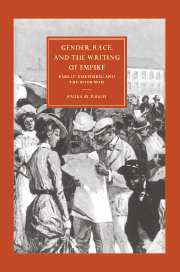Book contents
- Frontmatter
- Contents
- Acknowledgments
- 1 The war at home
- 2 The concentration camps controversy and the press
- 3 Gender ideology as military policy – the camps, continued
- 4 Cannibals or knights – sexual honor in the propaganda of Arthur Conan Doyle and W. T. Stead
- 5 Interpreting South Africa to Britain – Olive Schreiner, Boers, and Africans
- 6 The imperial imaginary – the press, empire, and the literary figure
- Notes
- Works cited
- Index
- CAMBRIDGE STUDIES IN NINETEENTH-CENTURY LITERATURE AND CULTURE
4 - Cannibals or knights – sexual honor in the propaganda of Arthur Conan Doyle and W. T. Stead
Published online by Cambridge University Press: 22 September 2009
- Frontmatter
- Contents
- Acknowledgments
- 1 The war at home
- 2 The concentration camps controversy and the press
- 3 Gender ideology as military policy – the camps, continued
- 4 Cannibals or knights – sexual honor in the propaganda of Arthur Conan Doyle and W. T. Stead
- 5 Interpreting South Africa to Britain – Olive Schreiner, Boers, and Africans
- 6 The imperial imaginary – the press, empire, and the literary figure
- Notes
- Works cited
- Index
- CAMBRIDGE STUDIES IN NINETEENTH-CENTURY LITERATURE AND CULTURE
Summary
Images of women were manipulated by both sides in the debate over the Boer War concentration camps, with neither side giving much attention to the lives of actual women in the camps. The army and the Colonial Office eventually had to recognize the importance of the women and children in the camps because the camps' death rates were reflecting badly on men whose duty was to protect women and children. The public debate surrounding the camps became a debate about gender. This chapter examines another public debate that involved women but was controlled by men. The exchange of war propaganda between Arthur Conan Doyle and W. T. Stead focuses on the sexual honor and conduct of the British soldier, but women are rarely given voice. The terms of the debate arise from the phenomenon of Victorian medievalism – Victorians went so far as to stage jousting matches and tournaments in their nostalgia for a medieval past, filtered through Victorian sensibilities. The core nostalgic notion of Victorian medievalism, its central metaphor, was the notion of chivalry as the right conduct of men toward women. The chivalrous man needed a woman to inspire him, but codes of chivalry were written for men; chivalry, for the Victorians, was a male-oriented set of ideas about how to be a good man.
- Type
- Chapter
- Information
- Gender, Race, and the Writing of EmpirePublic Discourse and the Boer War, pp. 80 - 108Publisher: Cambridge University PressPrint publication year: 1999

